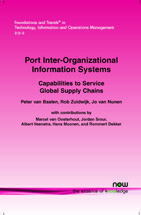Port Inter-Organizational Information Systems: Capabilities to Service Global Supply Chains
By Peter van Baalen, Associate Professor, Rotterdam School of Management, Erasmus University, Netherlands, pbaalen@rsm.nl | Rob Zuidwijk, Associate Professor of Supply Chain Management, Rotterdam School of Management, Erasmus University, Netherlands, rzuidwijk@rsm.nl | Jo van Nunen, Professor of Operations Research and Information Sciences, Rotterdam School of Management, Erasmus University, Netherlands, jnunen@rsm.nl
Abstract
This paper provides insights into the ways global sea ports are challenged by the need for managing complex information flows, given the developments in global supply chains. We argue that special port IT capabilities are needed to address these challenges by sharing information and planning and executing container transport in a collaborative way, establishing inter-organizational information architectures, and coordinating interests to successfully implement the technological infrastructures. We focus on the role of port community systems that support port communities in meeting the demands of global supply chains.
Port Inter-Organizational Information Systems
Port Inter-Organizational Information Systems aims at providing insights into the ways global sea ports are challenged by the need for managing complex information flows, given the developments in global supply chains. We argue that special port IT capabilities are needed to address these challenges by sharing information and planning and executing container transport in a collaborative way, establishing inter-organizational information architectures, and coordinating interests to successfully implement the technological infrastructures. We focus on the role of port community systems that support port communities in meeting the demands of global supply chains. Port Inter-Organizational Information Systems has a multidisciplinary nature and should be of interest to students, researchers, and practitioners in several fields, including information management, information systems, operations management, supply chain management, and technology management. The book combines a number of chapters where concepts are explained, while referring to a large repository of case studies provided in an appendix. Also, an introduction to the container transport network is provided in another appendix.
